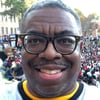For the people gathered at Lindsay Street Baptist Church for a town hall meeting marking the third anniversary of the killing of Kathryn Johnston, nothing much has changed in their neighborhood.
Widely known simply as English Avenue, the area is still wracked with drugs, violence and crime. Abandoned homes, some brand new but unsellable, still dot the neighborhood. Ivory Young, the city council representative in the area, said that only 13 percent of the property in the area is owner occupied. The rest is being rented or has been boarded up by an absentee landlord.
But for the people who attended the meeting, primarily to listen to mayoral candidates Mary Norwood and Kasim Reed, those who still love the area left with one thing -- a sense of remorse from the police department over Johnston’s death.
“I take full responsibility for what happened. What happened to Mrs. Johnston was tragic,” said Atlanta Police Chief Richard Pennington. “I don’t think anybody ever apologized to the Johnston family. But I’d like to take this moment to personally apologize. You can’t have an ongoing healing process until someone steps up and say they were wrong.”
It was three years ago this week that the 92-year-old Johnston exposed problems so deep inside certain parts of the APD that she nearly brought the department down. On the evening of Nov. 21, 2006, several members of the APD drug unit stormed into Johnston’s home and pumped two shots into her chest, killing her.
Members of the unit had obtained an illegal, no-knock search warrant, which allowed the officers to break down her door. The officers planted marijuana in the house after killing Johnston, who had fired a shot in self-defense as they were breaking down her door.
Three officers were later convicted of crimes and are currently serving prison time.
“We went through some difficult times and no one felt it more than I did,” Pennington said. “The officers broke the law. I was appalled and hurt. I don’t think this hurt will ever go away.”
More than a month before Christmas, Johnston’s former Neal Street home is the only one in the neighborhood with holiday lights. A man uses as old fashioned manual lawn mower to keep the grounds nice. Lights ring the railings and windows. A large table holds dozens of stuffed animals and flowers.
A painting of Johnston, looking at a flat-screen image of President Obama, graces the home’s front window. It is called, “Looking Back for Justice.”
“Nothing has changed around here. Burglaries still occur. I still hear gunshots,” said Janssen Robinson, who lives next door to Johnston’s home and is the artist of the painting. “The element is still here.”
Robinson locked his home and made his way to the church to here what the candidates had to say.
“I would rather see action, more than hear more words,” he said. “It is easy to say things. But it is action that we need around here.”
Both Norwood and Reed used the opportunity to lay out their plans for fighting crime. Both will aggressively seek a new chief to replace Pennington, who is retiring. Reed’s plan to open up all of the city’s recreation centers could be ideal in an area like English Avenue. Norwood’s plan to clean up neighborhoods and find slum lords was also tailored to the neighborhood. Both were well-received.
Norwood, who attended several community meetings after Johnston’s death, as well as her funeral, said little has changed since the murder.
“One of the reasons I am running for mayor is because I have not seen the improvements I wanted to see both in safety and in taking care of our community,” Norwood said. “Get rid of abandoned housing and get people back in them. Get the trash picked up. This community has mortgage fraud and abandoned homes. Who owns them? If we don’t know who they are, then why are their ... buildings here?”
Ask for a ranking, Reed said the city was at an “eight” in the severity of crime, part of which he blamed on the economy. Throughout the campaign, Reed has said he wants to hire 750 additional police officers and get kids off the streets.
“The population has grown 100,000 citizens and our police force has grown by 300 officers. We don’t have a big enough police force,” said Reed, adding that the lack of recreation centers contributes to a rise in property crimes. “We have 50,000 kids with nothing to do. I want to change that.”
Pennington agreed that more police officers are needed. He said when he came to the city in 2002, he had 1,400 officers and needed at least 2,000. He said the highest number he reached was 1,800 and the most officers he hired in a year was 250. But the department still loses 150 officers a year to retirement and resignations.
“They leave because of pay and benefits. We haven’t had a pay increment in 10 years," he said. “Atlanta has a great police department. We just don’t have enough police. I hope the candidates get the officers we need. I hope one day I will be able to see it – from afar.”
About the Author






